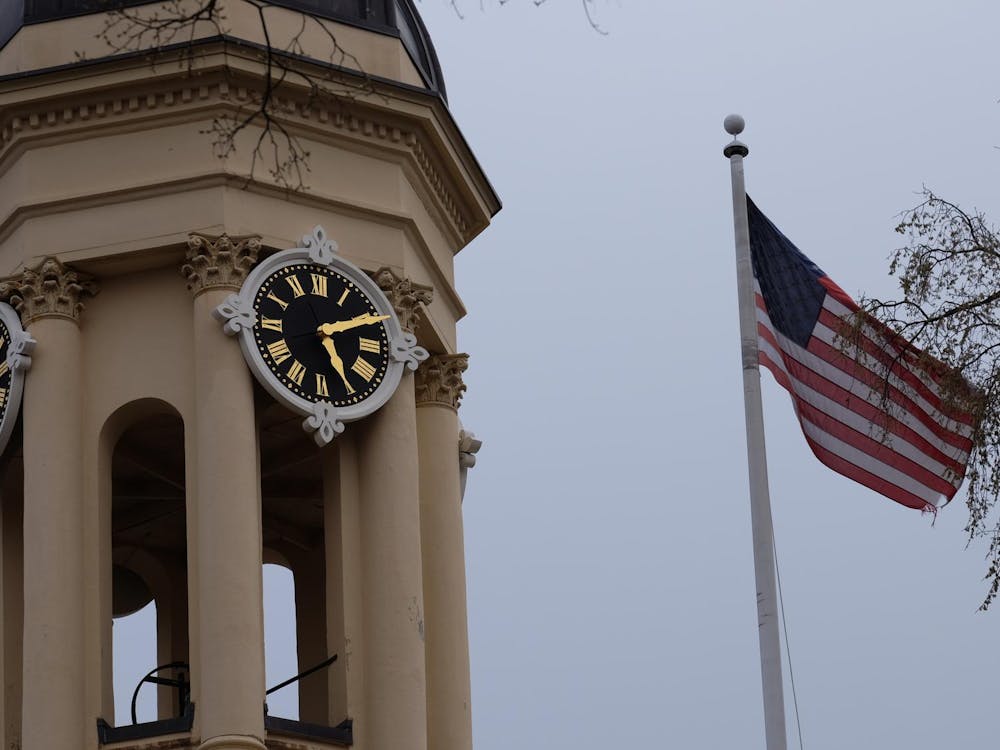The day well over a million people braved the January cold of Washington to witness Barack Obama’s inauguration found me in temperate Cairo. I had arrived just in time to watch the festivities on a large-screen television in a hotel whose rooms look out directly over the Great Pyramid, the last remaining Wonder of the Ancient World. There with me were a couple dozen Americans, most of them pleased about our new president and nearly all conspicuously dressed in orange and black: ties, scarves, pins and even a beer jacket or two. Of course you can run into Princetonians anywhere, but this was no accidental gathering. Rather, it was the beginning of a trip for alumni, “Egypt of the Pharaohs,” which I had the good fortune to be leading.
Everyone knows that lectures are not the same as seminars, that precepts are not the same as labs: Both the material covered and the dynamics are different. But what is it like to teach essentially the same material to different people under different circumstances? This is a question I have been pondering, thanks to having had the chance over the past few months to teach Egyptian hieroglyphs to three different constituencies: New Jersey schoolteachers, members of the Class of 2012 and alumni from the classes of 1951 to 1996. All three groups deserve what the youngest of these students would call a “shout-out.”
Let’s start with the Teachers as Scholars Program, which offers teachers from surrounding school districts the chance to get together at Princeton and learn about a collegiate subject in a collegial environment. The program gives K-12 educators in all fields the chance to take up to three days off work in order to talk about the meaning of democracy in the company of Stan Katz (no relation, sadly) or explore the process of scientific discovery with Nobel Prize-winning physicist Russell Hulse. It is no secret that pre-college teachers don’t get a lot of respect in this country, but I have for the past six years been regularly humbled to meet the “teacher-students” in my classes, who are always eager for both social and intellectual stimulation. Sure, I have taught them about ancient Egypt, but what they teach me is more important: how to communicate better, whatever the subject may be. I’m sorry that neither the calendar nor the budget allows me to take them to Egypt, but at least we get to go on the last afternoon to the Princeton University Art Museum, where they discover that 15 hours of instruction suffices for them to make out quite a bit of a 4,200-year-old false door from the tomb of the Priestess Ankh-Hathor.
Then there are the freshman seminars. Does Princeton have a better program for undergraduates? Not that I know of. Take no more than 15 bright-eyed, unjaded first-year students; add an enthusiastic teacher (this year’s roster includes Angela Creager, John Gager and Neil Rudenstine); stir in one of 75 engaging, off-beat subjects (“Life on Mars — or Maybe Not” or “Woodrow Wilson and the Battle of Princeton,” for example); and voila, you’ve got a great course. I have offered five freshman seminars over the years, and this and last year’s ones on Egypt had the most riotously enjoyable and mentally high-octane students I have ever taught. I badly wish I were able to take them to Egypt, but we did visit Rare Books and Special Collections, where University curator Don Skemer showed us a copy of the “Book of the Dead” that belonged to a “chantress of Amun”; the Art Museum, where Michael Padgett let us play with wonderful artifacts normally kept in storage; and the Metropolitan Museum in New York, where we frolicked along with Isis, Osiris and the cheerful docent Beatrice Cooper in the Temple of Dendur.
And the alumni trip to Egypt? Floating down the Nile with a drink in one hand, a whiteboard behind me and balloons over the Valley of the Kings off to the side — teaching doesn’t get much better than that. Old Tigers turn out to be a cross between the schoolteachers and the freshmen: accomplished adults filled with the intellectual eagerness of the super-smart teenagers they once were. When Obama was inaugurated, not one of them could read a word of Egyptian; when, two weeks later, we visited Abu Simbel, they could translate the ancient writing on the temples’ walls.
The day before the start of spring-term classes, I flew back home from Cairo via Munich, Germany, where almost 50 people in orange hoodies boarded the plane: the Chapel Choir, which had been touring in Spain. So you really can run into Princetonians everywhere.
Joshua Katz is a professor in the Department of Classics, the Director of the Program in Linguistics and a Forbes faculty adviser. He can be reached at jtkatz@princeton.edu.







